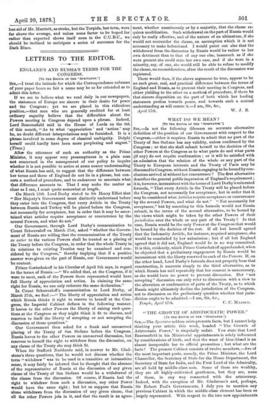LETTERS TO THE EDITOR.
ENGLAND'S AND RUSSIA'S TERMS FOR THE CONGRESS.
[TO THE EDITOR OF THE "SPECTATOR:I
trust the latitude for which the Correspondence columns of your paper bears so fair a name may be so far extended as to admit this letter.
If we are to believe what we read daily in our newspapers, the statesmen of Europe are sincere in their desire for peace and the Congress ; yet we are placed in this ridiculous position,—that men who are generally credited for at least ordinary sagacity believe that the difficulties about the Powers meeting in Congress depend upon a phrase. Indeed, Lord Beaconsfield said in the House of Lords on the 8th of this month, "As to what ' appreciation ' and 'action' may be, no doubt different interpretations may be furnished. It is a phrase involved in some degree of classical ambiguity. Delphi herself could hardly have been more perplexing and august." (Times.) After the utterance of such an authority as the Prime Minister, it may appear very presumptuous in a plain man not concerned in the management of our policy to inquire whether it is not possible to arrive at some nearer understanding of what Russia has said, to suggest that the difference between her terms and those of England do not lie in a phrase, but con- cern a method of procedure, and to endeavour to ascertain what that difference amounts to. That I may make the matter as clear as I can, I must quote somewhat at length.
On March 13th Lord Derby stated to Sir Henry Elliot that "Her Majesty's Government must distinctly understand before they enter into the Congress, that every Article in the Treaty between Russia and Turkey will be placed before the Congress, not necessarily for acceptance, but in order that it may be ascer- tained what articles require acceptance or concurrence by the several Powers, and what do not."
Our Government, tbrough Lord Derby's communication to Count Schouvaloff on March 21st, asked "whether the Govern- ment of Russia are willing that the communication of the Treaty ea entier to the various Powers shall be treated as a placing of the Treaty before the Congress, in order that the whole Treaty in its relations to existing Treaties may be examined and con- sidered by the Congress," thereby implying that if a positive answer were given on the part of Russia, our Government would be content.
Prince Gortschakoff in his Circular of April 9th says, in regard to the terms of Russia :—" We added that, at the Congress, if it were to meet, each of the Powers there represented would have full liberty of appreciation and action. In claiming the same right for Russia, we can only reiterate the same declaration."
In Count Schouvaloff's communication to Lord Derby, of March 27th, we find :—" The liberty of appreciation and action Which Russia thinks it right to reserve to herself at the Con- gress, the Imperial Cabinet defines in the following manner. It leaves to the other Powers the liberty of raising such ques- tions at the Congress as they might think it fit to discuss, and reserves to itself the liberty of accepting or not accepting the -discussion of those questions."
Our Government then asked for a frank and unreserved placing of the Treaty of San Stefano before the Congress. Russia leaves to the other Powers an unreserved discussion, but reserves to herself the right to withdraw from the discussion, on any clause of the Treaty she may think fit.
When Sir Stafford Northcote said, in answer to Mr. Glad- stone's three questions, that he would not discuss whether the term " withdraw " was to be used in a transitive or intransitive sense, it may fairly be inferred that he thought that the absence of the representative of Russia at the discussion of any given .clause of the Treaty of San Stefano would be a withdrawal of the clause from the discussion. Of course, if Russia had the right to withdraw from such a discussion, any other Power would have the same right ; but let us suppose that Russia alone withdraws from the discussion of any given clause, that all the other Powers join in it, and that the result is an agree- ment, whether unanimously or by a majority, that the clause re- quires modification. Such withdrawal on the part of Russia would only be really effective, and of the nature of an ultimatum, if she would not reconsider the clause, an assumption which it is not necessary to make beforehand. I would point out also that the withdrawal from the discussion by Russia would be rather to her own detriment than to that of any one else, inasmuch as if she were present she could state her own case, and if she were in a minority, say, of one, she would still be able to refuse to modify the clause, on reconsideration, after the result of the discussion was registered.
There would then, if the above argument be true, appear to be no such great, real, and practical difference between the terms of England and Russia, as to prevent their meeting in Congress, and either yielding to the other on a method of procedure, if there be that sincere disposition on the part of both which her leading statesmen profess towards peace, and towards such a mutual understanding as will ensure it.—I am, Sir, &c., April 17th. W. J. B.


































 Previous page
Previous page